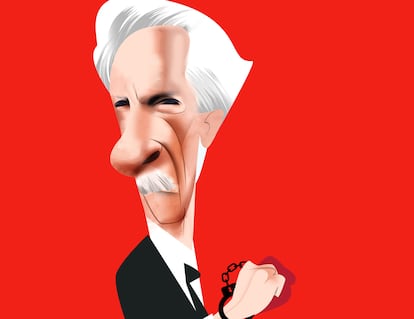José Rubén Zamora, the uncomfortable voice in the face of Guatemalan power that ended up behind bars
The journalist has been sentenced to six years in prison in a trial described as political persecution

Readers of elPeriódico who would buy the Sunday edition of the newspaper would always come across a section that raised more than one eyebrow in Guatemala. On that day, El Peladero was published: a political information column, written with humor and self-confidence. There, corruption cases were uncovered, politicians and government officials were taken to task and abuses of power were denounced. Much of the information was exclusive and came from credible sources who trusted its author, journalist José Rubén Zamora. He was the president of the newspaper he founded in 1996 and published information that other media were afraid to bring to light. It was precisely one of those humorous columns that unleashed hell for Zamora: the denunciation of corruption and abuses at the hands of President Alejandro Giammattei and one of his closest friends, a young man inseparable from the president who benefited from that relationship. The ogre and the little prince, he called them. The column full of intimate details generated such a stir that it marked the beginning of the persecution against the journalist, sentenced on Wednesday to six years in prison for money laundering in a trial that has been criticized as an act of political persecution against Zamora.
If there is one person who has been well-informed of everything that happens in Guatemala and how the powerful move, it is José Rubén Zamora. Politicians, businessmen, government officials, judges and prosecutors approached him to entrust him with sensitive information, which he then subjected to the work of a newsroom committed to investigative journalism. That is why Zamora became an uncomfortable voice in a country that is sinking deeper and deeper into the abyss of corruption and impunity, controlled by powerful economic groups that have plundered its wealth and governed by politicians always ready to get a good slice of the spoils. In fact, Zamora published up to 200 investigations on corruption cases under the Giammattei government, including the irregular purchase of vaccines at very high prices for the country and which benefited people close to the president. The newspaper uncovered a scheme in which the government granted a mining exploitation concession to a Russian company with an onerous contract and through bribes to public officials. El Peladero commented exclusively on the bacchanal with which the Russians were entertained. “They were treated like royalty”, he wrote.
Zamora became a thorn in the side of the powerful, both in the private sector and the government. He founded elPeriódico with the idea of delivering modern journalism to a society that was undergoing an enormous transformation. Peace agreements were being negotiated to put an end to a long civil war that caused 70,000 deaths and left one of the most terrible episodes in Latin American history: the genocide of local indigenous populations, mainly under the command of dictator Efraín Ríos Montt. Although the transition to democracy was difficult, Zamora saw journalism as a vehicle for building a modern, democratic Guatemala. “[He] gave us the opportunity to make the newspaper we wanted. We had a lot of freedom to create a good team and do something different. We were happy and we knew it. He would tell us: ‘You make the newspaper you want, and I’ll take care of getting the financing,’” recalls Ana Carolina Alpírez, who was editor-in-chief of the newspaper. Alpírez says that Zamora was rarely in the newsroom, precisely because he was trying to secure funding so that his reporters could their work with dignity and scrutinize the power in Guatemala. “At elPeriódico we learned to manage precariousness. We had limited resources to work with, but there was a lot of passion,” recalls Alpírez, who left the newspaper a decade ago. “José Rubén even counted the money himself to pay the payroll,” she adds. The newspaper had as many as 400 employees at its peak.
Zamora was born in Guatemala in 1956 and from the age of 17 began to practice the profession that would become his life’s passion. He studied engineering at the University of San Carlos, the most important university in Guatemala, and always showed himself to be a restless person, dedicated to creating projects related to communication. In 1990, he was among the founders of Siglo 21, a newspaper that became very prestigious in Guatemala, and six years later he created elPeriódico. He has received several international awards, including the Maria Moors Cabot Prize, awarded by Columbia University; the CPJ International Press Freedom Awards and the King of Spain International Journalism Award.
Juan Luis Font, editor of elPeriódico for 17 years, speaks from Ohio, U.S., where he went into exile due to the threats he suffered in Guatemala for doing his job. He recalls that from the beginning Zamora developed a combative journalism. The newspaper’s first major report was an investigation that denounced military personnel who smuggled contraband merchandise into the country. “José Rubén was fearless, and although he set himself certain limits in the eyes of financiers and advertisers, he never stopped denouncing abuses,” says Font.
It is because of that courage that many journalists in Guatemala have been afraid since Zamora’s arrest last summer and conviction for money laundering and the closure of the newspaper he loved so much. From prison, he has been calm and has stated that he will exhaust all legal avenues to prove his innocence. In the streets of Guatemala, reporters who believe in him hope that he will be free again and that he will once again confront the powerful. “I am sure that José Rubén will get out of jail. His unjust imprisonment causes us grief, but also sadness and anger. If they could touch him, what can the rest of the journalists in Guatemala expect?” asks Alpírez.
Sign up for our weekly newsletter to get more English-language news coverage from EL PAÍS USA Edition
Tu suscripción se está usando en otro dispositivo
¿Quieres añadir otro usuario a tu suscripción?
Si continúas leyendo en este dispositivo, no se podrá leer en el otro.
FlechaTu suscripción se está usando en otro dispositivo y solo puedes acceder a EL PAÍS desde un dispositivo a la vez.
Si quieres compartir tu cuenta, cambia tu suscripción a la modalidad Premium, así podrás añadir otro usuario. Cada uno accederá con su propia cuenta de email, lo que os permitirá personalizar vuestra experiencia en EL PAÍS.
¿Tienes una suscripción de empresa? Accede aquí para contratar más cuentas.
En el caso de no saber quién está usando tu cuenta, te recomendamos cambiar tu contraseña aquí.
Si decides continuar compartiendo tu cuenta, este mensaje se mostrará en tu dispositivo y en el de la otra persona que está usando tu cuenta de forma indefinida, afectando a tu experiencia de lectura. Puedes consultar aquí los términos y condiciones de la suscripción digital.









































